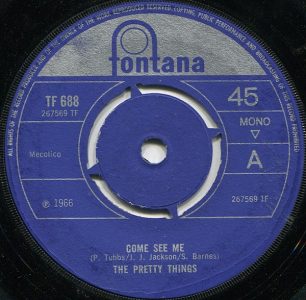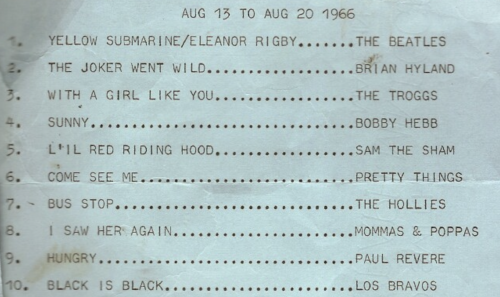#2: Come See Me by the Pretty Things
City: Kelowna, BC
Radio Station: CKOV
Peak Month: August 1966
Peak Position in Kelowna ~ #6
Peak position in Vancouver ~ did not chart
Peak Position on Billboard Hot 100 ~ did not chart
YouTube: “Come See Me”
Lyrics: “Come See Me”
The Pretty Things were a band formed in London, England, in 1963. The name was inspired by a song from 1955 by Bo Diddley. Prior to its formation, a band called Little Boy Blue and the Blue Boys was formed in 1962. It consisted of Mick Jagger and Keith Richards, and guitarist Dick Taylor. They hooked up with Brian Jones, Ian Stewart and Bill Wyman to become the Rolling Stones. Taylor left the band five months later to pursue studies at the Central School of Art and Design in London. A friend from college, vocalist Phil May, convinced Taylor to start a new band. Phil May (nee Kattner), born in 1944, was raised by an aunt whose surname was May. He took her name in his teens. They recruited Brian Pendleton on rhythm guitar, John Stax on bass guitar, and Pete Kitely on drums. Pendleton was born in 1944, and was working as a trainee to become an insurance clerk before responding to an ad placed in Melody Maker by Taylor and May. Stax was born in 1944 with the birth name John Edward Lee Fullagar. He adopted the name “Stax” because of his fondness for the music produced by Stax Records. Several more drummers tried to prove a good fit until the band settled on the drummer for Carter-Lewis and the Southerners’ Viv Prince.
The band got a contract with Fontana Records in early 1964. Their first single release, “Rosalyn”, climbed to #41 on the UK Singles chart. It was later covered by David Bowie in the early 70s. Their next release in late ’64, “Don’t Bring Me Down”, reached #10 in the UK, and #34 on the Canadian RPM Singles chart. The Pretty Things established themselves as offering a mix of beat, R&B, blues rock, garage rock and rock ‘n roll. A third release, “Honey I Need”, was a garage rock tune that climbed to #13 on the UK charts in 1965. That year they covered Bo Diddley’s “Roadrunner”, which peaked at #11 in the Netherlands. The hit single made the Pretty Things even more popular among Dutch teens than in the UK. “Cry to Me” subsequently peaked at #13 in the Netherlands, and cracked the Top 30 in the UK later in ’65.
The band later blamed their lack of success in the US on the fact their management opted for a tour of the Southern Hemisphere in July–August 1965. During their two weeks in New Zealand, they caused so much outrage in the media that the New Zealand Parliament addressed the issue of granting entry permits to musicians such as the Pretty Things. Viv Prince was so wild and unpredictable, that he became too much for the other bandmates. Viv Prince left the Pretty Things in November 1965. He was replaced on drums by Skip Alan, who was born in London in 1948.
In early ’66, the Pretty Things made a short film titled The Pretty Things on Film. In 1966, “Midnight to Six Man” was the bands’ first experiment with psychedelic rock fused with a garage rock sound. It climbed to #19 in the Netherlands, and made the Top 50 in the UK, and also charted in Australia.
Next up, the Pretty Things covered a song by J.J. Jackson titled “Come See Me”.

“Come See Me” was written by J.J. Jackson. In 1941, Jerome Louis Jackson was born in the Bronx, New York. In 1957 he had his first song recorded by Billy Williams called “The Lord Will Understand (And Say Well Done)” as one of three tracks on an Extended Play supporting Williams hit single “I’m Gonna Sit Right Down and Write Myself A Letter“. Jackson wrote songs recorded by the Flamingos, the Shangri-las’ B-side to “Remember (Walking In The Sand)”, Barbara Lewis and Eddie Floyd. In 1966, J.J. Jackson had a Top 30 hit titled “But It’s Alright”. Jackson had a second Top 20 single on the Billboard Rhythm & Blues chart in 1966 called “Four Walls“. The song had much of the same musical architecture that “But It’s Alright” possessed. But J. J. Jackson’s only other tune to break into the Billboard Hot 100 in early 1967 called “I Dig Girls“. After releasing a few albums, in the early ’70s J.J. Jackson left the music industry. However, in the 2010s J.J. Jackson was back on the concert circuit as part of oldies revues.
“Come See Me” is a song bragging that if someone a) needs loving, b) needs hugging, c) needs someone, d) is lonely, to understand “I’m your man.” The singer asserts “I’m greater than the seventh son,” and is convinced “you’re gonna be my pussycat.”
In ancient folklore, the seventh son of a seventh son is someone who is bestowed special powers. To qualify as “the seventh son of a seventh son” one must be the seventh male child born in an unbroken line with no female siblings born between, and to a father who himself is the seventh male child born in an unbroken line with no female siblings born between. In Ireland and England, a seventh son was someone who was a healer. In Italy a seventh son of a seventh son was someone who could enchant snakes and was immune to their venom. In contrast, in Latin America, it was believed that a seventh son was cursed to be a werewolf. While in Romania it was believed that a seventh son would become a vampire.
“Come See Me” peaked at #6 in Kelowna (BC). Internationally, “Come See Me” peaked at #36 in the Netherlands, #43 in the UK and #92 in Australia. The band had two more charting hits that year. They covered the Kinks song “A House in the Country” which peaked at #31 in the Netherlands, and #50 in the UK. Their final charting single, “Progress”, stalled at #55 in the UK.
Brian Pendleton left in December 1966 and was replaced on stage by Billy Harrison from Them. John Stax departed in January 1967. Jon Povey and Wally Waller, both former Fenmen from Bern Elliott and the Fenmen, joined and made the band a five-piece once again. In the recording studio, the Pretty Things were now comprised of Dick Taylor, Phil May, Skip Allan, Jon Povey and Wally Waller. Their third and final studio album with Fontana Records was Emotions. Neither of the singles from the album, “Children” or “Trippin'”, cracked the national pop charts anywhere.
The Pretty Things moved over to Columbia Records to release S.F. Sorrow. The album was a psychedelic rock opera. Pop Matters wrote that the album “mixes the story of the protagonist Sebastian and his journey towards learning to trust people and ultimate disillusionment with a psychedelic pop score that fittingly captured the mood of 1960s Swinging London”. Phil May recalled, “We were looking for another way of making a 40-minute disk. I could never understand why an album had to be five A-sides and five B-sides with no connection. Pieces of music had been written for at least a 40-minute listen, and I thought the best way to do that was to overlay a story line and create music for the various characters and instances. It was the oldest concept in the world, but at the time nobody had done it before.” In 1998, the New York Times said of the album that it was “Loaded with rich harmonies, sharp dissonances, odd electronic effects, early Pink Floyd-style psychedelia, proto heavy metal and songs that drastically change styles from one moment to the next, the album was full of pop experiments and abstractions that have become a calling card for current underground alternative bands.”
During the late 1960s, the Pretty Things made some extra money by recording for music library company DeWolfe. Some of these songs ended up in low-budget films including What’s Good for the Goose (1969) (which the band also appeared in), The Haunted House of Horror (1969), Dawn of the Dead (1978), and a couple of software porn films. Not intended for official release, these songs were later compiled on a number of records and released under the alias Electric Banana: Electric Banana (1967), More Electric Banana (1968), Even More Electric Banana (1969), Hot Licks (1970), and Return of the Electric Banana (1978). The initial releases featured one side of vocal and one side of instrumental tracks. Subsequent releases of these albums generally keep the true identity of the band secret.
Dick Taylor left the Pretty Things in 1969. In the mid to late ’80s, Taylor played with the post-punk band the Mekons.
John Stax emigrated to Australia in 1970 where he currently resides. He builds and sells cigar box guitars. He rejoined the Pretty Things on their 2012 Australian tour, taking the stage on a couple of songs to play bass guitar and harmonica and also guested for a song on their 2018 Farewell Tour in Melbourne. Stax also played with Melbourne R&B ‘supergroup’ Blues Hangover.
Phil May remained with the Pretty Things until 2018. In 1976, he released an album in the Netherlands titled Phil May and the Fallen Angels. This was a separate project from his gig with the Pretty Things.
Over the decades, the Pretty Things released 14 studio albums, 14 live albums and 34 singles. Their last studio album, Bare as Bone, Bright as Blood, was released in 2020.
Brian Pendleton became an insurance underwriter and followed this career for over 20 years, working for Sun Alliance Insurance and later the Prudential.In 2001, Brian Pendleton died of lung cancer at the age of 57. Phil May died in 2020 at the age of 75, due to hip surgery complications. As of 2024, Dick Taylor plays lead guitar with a band called the Hillmans.
November 25, 2024
Ray McGinnis
References:
Ritchie Unterberger, “Dick Taylor,” Ritchieunterberger.com, 2001.
“The Story and Music of J.J. Jackson,” Mental Itch.com.
“The 1965 Pretty Things tour of NZ: Part 2,” Kiwi Musicians in Oz, October 16, 2018.
Mike Stax, Andy Neill & John Baker, DON’T BRING ME DOWN…UNDER: The Pretty Things in New Zealand, 1965, UT Publishing, 2006.
Rob Hughes, ““The press called us The Dirty Things: ‘Did you see them last night? Disgusting!’”: the epic story of The Pretty Things, the cult British band who should have been as big as the Rolling Stones,” Louder Sound.com, February 10, 2024.
Alan Clayson, “Brian Pendleton: Obituary,” Guardian, June 27, 2001.
“Pretty Things frontman Phil May dies aged 75,” BBC, May 15, 2020.
“Interview! The Pretty Things – a special feature ahead of the release of the band’s deluxe, career spanning box set, due out next week,”
Louder than War, February 16, 2015.

CKOV 630-AM Kelowna (BC) Top Ten | August 13, 1966

Leave a Reply